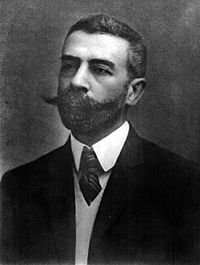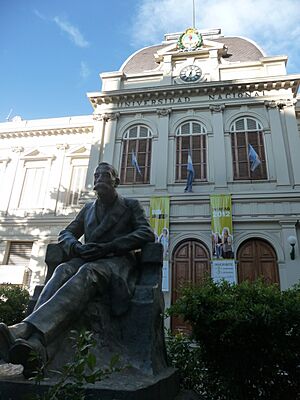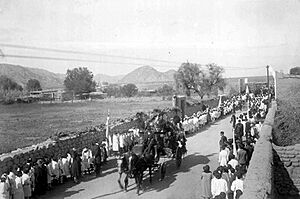Joaquín V. González facts for kids
Quick facts for kids
Joaquín Víctor González
|
|
|---|---|
 |
|
| National Senator | |
| In office 1916–1923 |
|
| Constituency | La Rioja |
| Rector of the University of La Plata | |
| In office 1906–1918 |
|
| Preceded by | Dardo Rocha |
| Succeeded by | Rodolfo Rivarola |
| Minister of Justice and Public Instruction | |
| In office 1901 – 1906 |
|
| President | Julio Roca Manuel Quintana |
| Preceded by | Juan Serú |
| Succeeded by | Federico Pinedo |
| Governor of La Rioja Province | |
| In office June 24, 1889 – October 8, 1891 |
|
| Preceded by | Antonio García |
| Succeeded by | Dermidio Carreño |
| Personal details | |
| Born | March 6, 1863 Nonogasta, La Rioja Province (Argentina) |
| Died | December 21, 1923 (aged 60) Buenos Aires |
| Political party | National Autonomist Party |
| Spouse | Amalia Luna Olmos |
| Occupation | Journalist and academic |
Joaquín Víctor González (born March 6, 1863 – died December 21, 1923) was an important Argentine person. He was a teacher, a writer, a judge, and a politician. He helped shape Argentina's laws and education system.
Contents
Joaquín Víctor González: A Life of Learning and Leadership
Early Life and Education
Joaquín Víctor González was born on March 6, 1863. His hometown was Nonogasta, a small town in La Rioja Province, Argentina. He went to a special school called Colegio de Monserrat in Córdoba.
In 1881, he started working as a journalist. He wrote for several local newspapers. He also taught history, geography, and French at a local teacher training school.
Becoming a Lawyer and Politician
González studied law at the University of Córdoba. He became a lawyer in 1886. After that, he went back to La Rioja Province. He helped his home province in a land disagreement with Córdoba Province.
Later that year, he was chosen to be a member of the Lower House of Congress. He was re-elected three times and served until 1901.
As a Congressman, he helped create the new laws for La Rioja Province in 1887. He also wrote his first book, La Revolución de la Independencia Argentina. He started working for La Prensa, a major newspaper in Buenos Aires.
He taught law at the University of Buenos Aires. In 1889, he married Amalia Luna Olmos, and they had five children. That same year, he became the Governor of La Rioja. As governor, he wrote La Tradición nacional (1891). This book looked at how different regions of Argentina were shaped by their geography and history.
After his time as governor, he returned to Buenos Aires. He became a professor at the University of Buenos Aires. In 1896, he joined the National Educational Council.
Important Government Roles
In 1901, President Julio Roca chose González to be the Minister of Internal Affairs. This was a very important job. He also sometimes filled in as Minister of Justice, Government, and Foreign Relations. He used his knowledge to help with many discussions about law.
As Minister of Internal Affairs, he changed how voting was organized. This made it easier for different candidates to be elected. For example, Alfredo Palacios, the first Socialist Congressman in Argentina (and Latin America), was elected in 1904.
González himself was a more traditional politician. He wrote Mis montañas (My Mountains) in 1903. This book was a tribute to the beautiful Talampaya landscape where he grew up.
In 1904, President Manuel Quintana made him the Minister of Justice and Education. During this time, González started a teacher training school. This school was later named in his honor.
He also helped reorganize the National University of La Plata in 1905. The next year, he became its president. He added many departments to the university. He also gave his large library and his vacation home, Samay Huasi, to the university.
Later Life and Academic Achievements
In 1906, Joaquín Víctor González became a member of the Real Academia Española. This is a very important group that studies the Spanish language. In 1916, he was elected to the Argentine Senate. He was still the president of the university at this time.
He left the university in 1918. He went back to the University of Buenos Aires to teach. He taught about constitutional law and public law. He also wrote regularly for La Nación, a major newspaper. He even translated a book of poems by Rabindranath Tagore.
González joined the International Law Association in 1919. He strongly supported the League of Nations, which was an organization created to promote peace after World War I. His work helped him get nominated to the International Court of Justice at The Hague in 1921. This is a very high honor for a legal expert.
His book Patria y democracia (Fatherland and Democracy) was published in 1920. It explored the different political ideas and tensions in Argentina.
Joaquín Víctor González passed away in Buenos Aires in 1923, at the age of 60. After he died, another one of his books, Fábulas nativas, was published in 1924. He left behind a huge collection of writings, including over fifty books on many different topics.
See also
 In Spanish: Joaquín Víctor González para niños
In Spanish: Joaquín Víctor González para niños
 | Anna J. Cooper |
 | Mary McLeod Bethune |
 | Lillie Mae Bradford |



